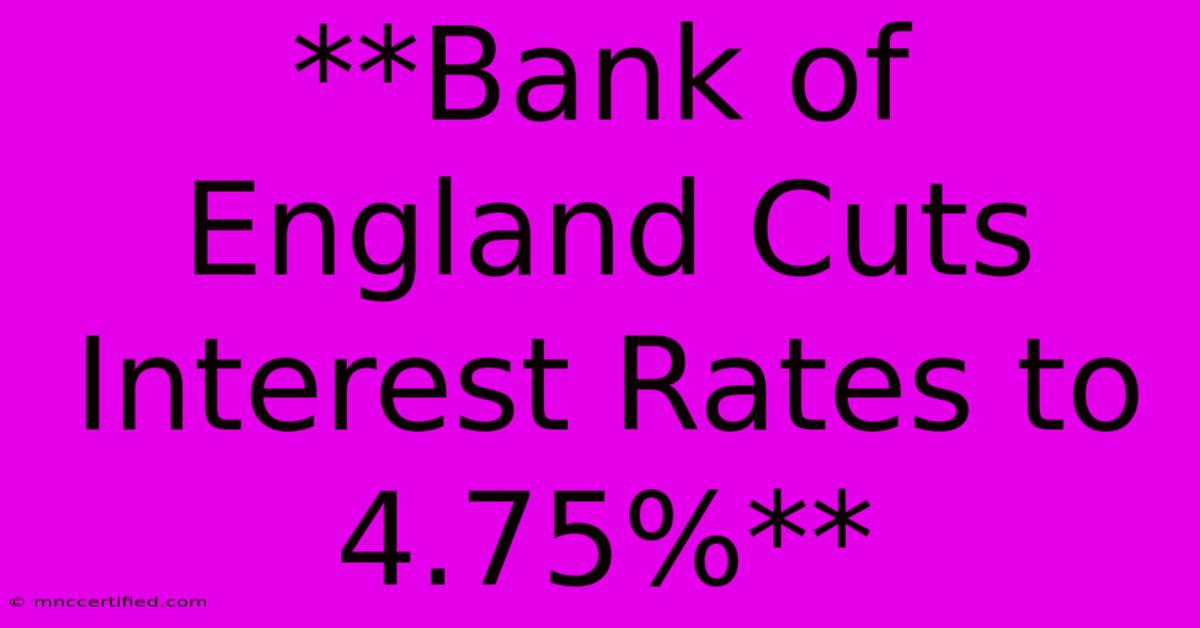**Bank Of England Cuts Interest Rates To 4.75%**

Table of Contents
Bank of England Cuts Interest Rates to 4.75%: What Does This Mean for You?
The Bank of England (BoE) has announced a surprise cut to interest rates, lowering them by 0.25% to 4.75%. This unexpected move has sent shockwaves through the financial markets, leaving many wondering about the implications for the UK economy and their personal finances.
Why Did the BoE Cut Interest Rates?
The BoE cited a softening of the UK economy as the primary reason for the rate cut. The latest economic data suggests a slowdown in growth, with inflation showing signs of moderating. However, the central bank is still concerned about the potential for persistent inflation and acknowledges the need for further monitoring.
What Does the Rate Cut Mean for Borrowers?
Lower borrowing costs! The rate cut means that borrowing money will become cheaper for individuals and businesses alike. This could lead to increased consumer spending and business investment, stimulating economic activity.
Here are some potential benefits:
- Mortgage holders: Existing mortgage holders might see their monthly repayments decrease, freeing up some disposable income.
- Businesses: Lower interest rates can make it easier for businesses to borrow money for expansion and investment, boosting job creation and economic growth.
- Consumers: Individuals may find it easier and more affordable to borrow money for purchases such as cars, appliances, or home improvements.
What Does the Rate Cut Mean for Savers?
Lower returns on savings! Unfortunately, the rate cut could result in lower returns on savings accounts and bonds. This is because banks and other financial institutions will likely lower their interest rates offered to savers in response to the BoE's decision.
Here are some potential drawbacks:
- Savings erosion: Your savings may not grow as quickly as they used to.
- Potential for inflation: While inflation is slowing down, it's still above the BoE's target of 2%. This means your savings might not be keeping up with the rising cost of living.
What Does the Rate Cut Mean for the UK Economy?
The BoE hopes that the rate cut will provide a much-needed boost to the UK economy. However, the effectiveness of this measure depends on various factors, including consumer confidence, business investment, and the global economic outlook.
Here are some potential implications:
- Stimulated growth: Lower borrowing costs could encourage spending and investment, leading to economic growth.
- Weak pound: The rate cut could weaken the value of the pound sterling, making imports more expensive and potentially increasing inflation.
- Uncertainty: The rate cut adds to the already existing economic uncertainty, making it difficult for businesses to plan for the future.
What Should You Do?
The best course of action depends on your individual circumstances.
- Borrowers: Consider locking in a lower interest rate on your existing loans or taking advantage of cheaper borrowing options.
- Savers: You may want to explore alternative investments that offer higher returns, such as stocks or bonds.
- Businesses: Analyze the impact of the rate cut on your borrowing costs and adjust your investment strategies accordingly.
The BoE's decision to cut interest rates is a significant development with potential implications for individuals, businesses, and the UK economy. It's crucial to stay informed about the evolving economic landscape and make informed decisions based on your specific financial goals.

Thank you for visiting our website wich cover about **Bank Of England Cuts Interest Rates To 4.75%**. We hope the information provided has been useful to you. Feel free to contact us if you have any questions or need further assistance. See you next time and dont miss to bookmark.
Featured Posts
-
Aclu Prepares To Fight Trump Policies
Nov 08, 2024
-
Germanys Governing Coalition Implodes
Nov 08, 2024
-
Mutual Of Omaha Evidence Of Insurability
Nov 08, 2024
-
Internet Access Fuels Porn Addiction In North Korea
Nov 08, 2024
-
Family Life Insurance Company Houston Tx
Nov 08, 2024